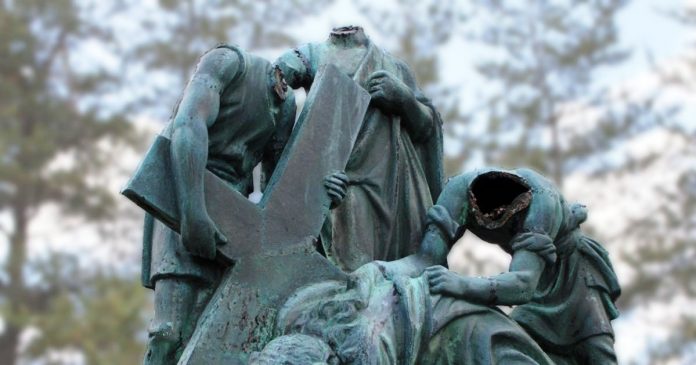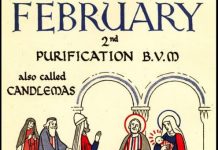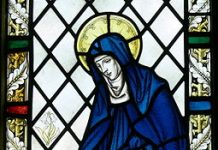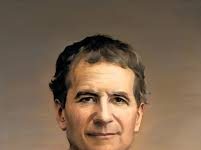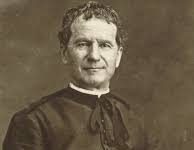(The original of the following can be found in the writings of the well known French author Louis Veuillot, translated from the Italian and submitted to Catholic Insight by Father Thomas Carleton)
In the 1800’s there lived in the Pyrenees a physician called Fabas. The doctor himself recounted to Veuillot and many others, that he saw arrive at Eaux-Bon a man who had on his leg a gun wound. The sore, by now old, presented a particular phenomenon: it produced small worms. The doctor tried to get rid of the worms but nothing worked.
One day the patient said to him: “Doctor, that’s enough, don’t do anything else; I shall die with this horrible trouble.” In fact, responded the doctor, there is something extraordinary here. I have never seen a similar case. Wherever did you receive this wound? “In Spain, as I have told you on other occasions”, replied the man, “but I still haven’t told you the reason why it will not heal. at last I want you to know.
I was 20 years old”, he proceeded with difficulty, “and the year was 1793, when I was obliged to join a regiment that the Convention was sending to Spain. Three of us left from our village: we were non-believers or more precisely impious, like three small delinquents bragging about living wildly.
The journey was lighthearted. We were about to meet up with our unit when, passing through a mountain village, we saw a statue of the Virgin Mary, so venerated that despite the revolution and the revolutionaries that had gone through before us, the statute had not been mutilated and it had remained intact on the pedestal above the main door of the church. One of us had the evil idea of insulting the statue so as to challenge the superstition of the villagers.
We had our rifles. Tom proposed to shoot at the statue. Frank, guffawing, accepted the proposal. Not wishing to appear less daring than my buddies, I timidly tried to turn them away from the idea, which in the bottom of my heart frightened me. I remembered my mother . . . They made fun of me. Tom loaded the rifle and shot. The bullet hit the statue in the forehead. Frank on his turn did the same and hit it in the chest. ‘Now it’s your turn’, they said. I didn’t have the courage to say ‘no’ and shaking I took aim, involuntarily closed my eyes and hit the statue in the leg.
After this fine act we set out in a rush to continue the journey. An old lady, who had seen us, however, said to us: ‘You are going to war, but what you have done, won’t bring you luck’. Tom threatened her. I was sorry about it; and Frank, although not so moved, was not happy. We held back Tom from raging against the old lady, and we finished the day not without arguing among ourselves. That evening we joined up with our unit.
After a few says we meet the enemy. Let me confess that I went to the encounter with gloom, and I was thinking about the statue more than I wanted to think about it. Nevertheless the encounter went well. We carried off a decided advantage. Tom distinguished himself. The battle was ended: the enemy was in flight and the colonel commanded us not to pursue them further, when a shot was heard from a boulder and seemed to come out of the sky. Tom tumbled over himself and fell face to the ground. Frank and I ran over to raise him up. He was dead. A bullet had hit him in the brow between the two eyes, right where his shot a few days before had hit the statue. Frank and I looked at each other, mute, pallid as death.
During the night, Frank was at my side, he didn’t sleep. I was waiting for him to speak to me so as to advise him to say a prayer: but he was silent, and I didn’t dare start the conversation about the thought that was keeping us awake.
The next day the enemy reappeared with greater force. When we saw them, Frank grabbed my hand and said to me: ‘Today it’s my turn; you’re lucky you had a bad aim’.
This time we were pushed back. We had fought a long time in retreat; Frank and I were un-wounded. A vain hope! The poor fellow wasn’t deceiving himself. A rifle shot came from a ditch, where a Spaniard was lying mortally wounded. It went right through Frank’s chest from one side to the other. He keeled over. And what a death! He rolled on the ground calling for a priest; the soldiers, who were near him, held down his shoulders, and he passed away. He was left on the road.
From that point on, I was convinced that not much time would pass before I too had to be hit, and I resolved to confess my sacrilege to the first priest that I met. Unfortunately I didn’t encounter one. Meanwhile other battles occurred without myself being wounded: little by little my terror went away and with it my good resolution.
When we were recalled into France, I had been promoted and I was no longer thinking either about the crime or the punishment. Through an unexplainable accident a pistol shot came from our ranks and hit me here where you see. As such was fulfilled the prophecy of the old woman, who had told us after the sacrilege (I can still hear her): ‘You are going to war; but what you have done won’t bring you luck‘. My two companions were dead and I was returning wounded.
At first sight, however, the wound didn’t appear at all serious. The surgeon told me that after a few days’ hospital stay I would come out okay. I even believed him! It was to his surprise and my fear, when he saw germinating in the sore these indestructible worms which have puzzled your profession. I have dragged around this wound, trying all remedies but they have proved useless.
Although I pray to God to heal me, I can’t complain about it. I don’t lament over it. This wound has been a cure for many souls and above all for my own. I’m not unmindful that, if I arrive at the end of my life as it is my duty to arrive as a Christian and repentant, I shall be grateful to this terrible wound and then I shall console myself with having limped. Though I doubt about a cure, I don’t doubt the mercy of God.”
(Lisi, Sac. Prof. Sebastiano; CENTO ESEMPI; Giarre, 1894. [Translation from the Italian by Fr. Thomas Carleton])

